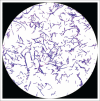Post-procedural Bacillus cereus septic arthritis in a patient with systemic lupus erythematosus
- PMID: 32934911
- PMCID: PMC7479407
- DOI: 10.4102/ajlm.v9i1.1119
Post-procedural Bacillus cereus septic arthritis in a patient with systemic lupus erythematosus
Abstract
Introduction: Bacillus species are often considered as contaminants when cultured from clinical samples. Bacillus cereus may be a pathogen in certain circumstances and is known to cause musculoskeletal infections. This report aims to educate clinicians and clinical microbiology laboratories on B. cereus musculoskeletal infections and to heighten awareness that Bacillus species should not always be dismissed as contaminants.
Case presentation: We report the case of a patient who presented to a tertiary hospital in Pretoria, South Africa, in November 2018 with B. cereus septic arthritis and underlying systemic lupus erythematosus (SLE). The isolate would otherwise have been dismissed as a contaminant had it not been for the crucial interaction between the laboratory and the treating clinicians. To our knowledge, this is the first case report of septic arthritis caused by B. cereus in an SLE patient where the organism was cultured from the joint specimen. Identification of the organism was performed using matrix-assisted laser desorption/ionisation mass spectrometry.
Management and outcome: Definitive treatment was with intravenous vancomycin, continued for four weeks, in addition to arthroscopy and management of the underlying SLE. The patient had a good clinical outcome and regained full mobility.
Conclusion: Musculoskeletal infections, specifically septic arthritis caused by B. cereus, are exceedingly rare infections. Immune suppression, trauma, prosthetic implants and invasive procedures are important risk factors for B. cereus musculoskeletal infections. Close collaboration with a multi-disciplinary team approach will effect the best outcome for complicated patients with B. cereus infections.
Keywords: Bacillus cereus; MALDI-TOF MS; Matrix-assisted laser desorption/ionisation mass spectrometry; arthroscopy; musculoskeletal infection; septic arthritis; systemic lupus erythematosus.
© 2020. The Authors.
Conflict of interest statement
The authors have declared that no competing interests exist.
Figures
References
-
- Clinical and Laboratory Standards Institute (CLSI) Methods for antimicrobial dilution and disk susceptibility testing of infrequently isolated or fastidious bacteria. 3rd ed. CLSI guideline M45 Wayne, PA: Clinical and Laboratory Standards Institute; 2015. - PubMed
LinkOut - more resources
Full Text Sources


